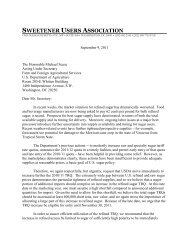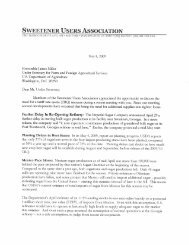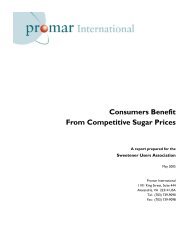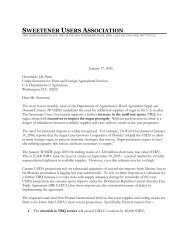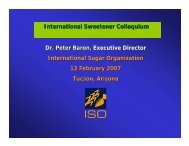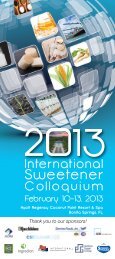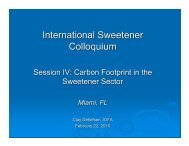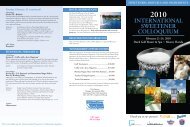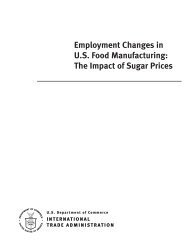Comments to the Trade Policy Staff Committee - Sweetener Users ...
Comments to the Trade Policy Staff Committee - Sweetener Users ...
Comments to the Trade Policy Staff Committee - Sweetener Users ...
Create successful ePaper yourself
Turn your PDF publications into a flip-book with our unique Google optimized e-Paper software.
SWEETENER USERS ASSOCIATION<br />
ONE MASSACHUSETTS AVE. NW • SUITE 800 • WASHINGTON, DC 20001 • (202) 842-2345 • (202) 408-7763 FAX<br />
Position of <strong>the</strong><br />
<strong>Sweetener</strong> <strong>Users</strong> Association<br />
On <strong>the</strong> World <strong>Trade</strong> Organization Doha Round Negotiations<br />
December 2005<br />
The <strong>Sweetener</strong> <strong>Users</strong> Association (SUA) represents companies that produce confectionery,<br />
grocery products, dairy foods, soft drinks and o<strong>the</strong>r products made with nutritive sweeteners, as<br />
well as trade associations representing <strong>the</strong> interests of <strong>the</strong>se companies.<br />
Our members believe a successful WTO Doha Round will benefit U.S. agriculture and our<br />
nation’s food industry by opening up new opportunities for export sales, including sales of <strong>the</strong><br />
processed foods manufactured by many of our members.<br />
We support <strong>the</strong> elimination of export subsidies, reductions in trade-dis<strong>to</strong>rting support and<br />
substantial improvements in market access as called for in <strong>the</strong> comprehensive U.S. proposal on<br />
agriculture, which was released in Oc<strong>to</strong>ber. SUA’s position on <strong>the</strong> Doha Round agricultural<br />
negotiations is as follows:<br />
• SUA believes that substantial improvement in market access in <strong>the</strong> Doha WTO<br />
Round is critical <strong>to</strong> <strong>the</strong> success of <strong>the</strong> negotiations. The U.S. agriculture and food<br />
industry have much <strong>to</strong> gain from more liberalized world trade in this vital sec<strong>to</strong>r.<br />
• We support <strong>the</strong> U.S. agriculture proposal that calls for deep tariff cuts as well as <strong>the</strong><br />
substantial expansion of tariff-rate quotas and <strong>the</strong> limitation of tariff lines for<br />
sensitive products. The U.S. proposal <strong>to</strong> limit “sensitive products” <strong>to</strong> 1 percent of tariff<br />
lines would benefit U.S. farm exports <strong>to</strong> a much greater degree than <strong>the</strong> recent EU<br />
proposal <strong>to</strong> allow 8 percent of tariffs lines <strong>to</strong> be essentially excluded from any real<br />
competition.<br />
• Tariff-rate quotas should be expanded <strong>to</strong> permit <strong>the</strong> entry of substantially greater<br />
quantities, and ultimately abolished. The U.S. and G-20 proposals are consistent with <strong>the</strong><br />
July 2004 Agriculture Framework text on this issue in regard <strong>to</strong> expanding TRQs. We<br />
support <strong>the</strong> U.S. proposal on sensitive products, which increases <strong>the</strong> WTO minimum<br />
TRQ by 7.5 percent of consumption.
• Tariffs should be reduced through a formula approach that assures coverage of all<br />
products. We support <strong>the</strong> U.S. proposal, which provides for progressive tariff reduction<br />
from tiered tariff levels and establishes a tariff cap ensuring that no tariff is higher than<br />
75 percent.<br />
• The Doha Round should lead <strong>to</strong> reductions in market access barriers, not increases.<br />
No tariff anywhere in <strong>the</strong> world, on any product, should increase, nor should any nontariff<br />
barrier anywhere in <strong>the</strong> world, on any product, become more restrictive, as a result<br />
of <strong>the</strong> Round. SUA believes that all products must be subject <strong>to</strong> negotiation, and <strong>the</strong> final<br />
agreement must actually include all products.<br />
• Export subsidies should be eliminated worldwide as called for in <strong>the</strong> U.S. proposal.<br />
The WTO ruling against <strong>the</strong> EU Sugar Regime is correct in finding that schemes such as<br />
<strong>the</strong> European Union’s preferential access for former colonies should not be used <strong>to</strong> justify<br />
<strong>the</strong> continuation of export subsidies.<br />
• Domestic support should be provided in ways that permit market forces <strong>to</strong> set prices.<br />
<strong>Trade</strong>-dis<strong>to</strong>rting domestic supports should be reduced substantially, with deeper cuts by<br />
countries with larger subsidies as proposed by <strong>the</strong> U.S. The U.S. proposal <strong>to</strong> reduce<br />
amber box subsidies by 83 percent for more heavily subsidized countries will help level<br />
<strong>the</strong> playing field for <strong>the</strong> U.S. agriculture and food industry sec<strong>to</strong>r.<br />
Market Access<br />
The United States can only gain access <strong>to</strong> o<strong>the</strong>r markets if it is successful in aggressively<br />
reducing tariffs. By using <strong>the</strong> tiered formula agreed <strong>to</strong> in <strong>the</strong> July 2004 Agriculture Framework<br />
and taking in<strong>to</strong> account <strong>the</strong> formula proposed by <strong>the</strong> G-20 countries, <strong>the</strong> U.S. proposal provides a<br />
phase-in period of five years for WTO member countries <strong>to</strong> make substantial improvements in<br />
market access by implementing real tariff cuts <strong>to</strong> all commodities, whe<strong>the</strong>r sensitive or<br />
o<strong>the</strong>rwise.<br />
The July 2004 Framework required that substantial improvement in market access be applied <strong>to</strong><br />
all products, even those considered sensitive. Tariff-rate quotas (TRQs) should be expanded <strong>to</strong><br />
permit <strong>the</strong> entry of substantially greater quantities and TRQ expansion should apply <strong>to</strong> all TRQs<br />
(including those established pursuant <strong>to</strong> both minimum access and current access obligations<br />
under <strong>the</strong> Uruguay Round).<br />
The expansion of TRQs should not prejudice <strong>the</strong> operations of any legitimate free trade<br />
agreement, including <strong>the</strong> North American Free <strong>Trade</strong> Agreement. Preferential quotas under<br />
NAFTA are in addition <strong>to</strong>, not part of, <strong>the</strong> minimum TRQ, and must remain so.<br />
Tariffs should be reduced through a formula approach that assures coverage of all products and<br />
tariffs should be capped at a commercially meaningful level. We support <strong>the</strong> U.S. proposal on<br />
sensitive products, which provides that <strong>the</strong>re should be both a substantial expansion of <strong>the</strong> TRQ<br />
level and a reduction in <strong>the</strong> over-quota tariff.
The revised EU agriculture proposal calls for 8 percent of tariff lines <strong>to</strong> be treated as “sensitive<br />
products” in contrast with <strong>the</strong> U.S. proposal of capping such treatment at 1 percent of all<br />
agricultural product tariff lines. The EU proposal would allow it <strong>to</strong> maintain high tariff barriers<br />
for about 176 of 2,200 agriculture products. Therefore, we strongly support <strong>the</strong> comments of<br />
U.S. <strong>Trade</strong> Representative Rob Portman, who correctly pointed out that <strong>the</strong> EU’s treatment of<br />
sensitive products would it <strong>to</strong> shelter such commodities under relatively high import barriers.<br />
SUA believes <strong>the</strong> most recent G-20 proposal on “sensitive products” is consistent with <strong>the</strong> U.S.<br />
proposal because it calls for greater expansion of <strong>the</strong> TRQ as <strong>the</strong> price for smaller cuts in <strong>the</strong><br />
over-quota tariff. This is an improvement on a previous G-20 proposal that only required cuts <strong>to</strong><br />
be made from bound ra<strong>the</strong>r than applied tariffs (cuts based on <strong>the</strong> bound rate would not have<br />
allowed any significant market access). The U.S. and G-20 proposals on sensitive products<br />
<strong>to</strong>ge<strong>the</strong>r may help keep <strong>the</strong> EU in a negotiating corner on this issue.<br />
Export Subsidies<br />
Export subsidies should be eliminated worldwide. In <strong>the</strong> sugar market, export subsidies –<br />
particularly those of <strong>the</strong> European Union – not only tend <strong>to</strong> depress prices, but also encourage<br />
<strong>the</strong> maintenance of restrictive border measures as a means of countering <strong>the</strong>ir effect.<br />
As evidenced by <strong>the</strong> WTO ruling against <strong>the</strong> EU Sugar Regime, schemes such as <strong>the</strong> European<br />
Union’s preferential access for former colonies should not be used <strong>to</strong> justify <strong>the</strong> continuation of<br />
export subsidies. The EU has decided <strong>to</strong> begin making serious cuts in its sugar program by<br />
reducing its raw sugar support price by 36 percent <strong>to</strong> comply with <strong>the</strong> adverse WTO ruling.<br />
Clearly, <strong>the</strong> EU – and o<strong>the</strong>r nations – should end all export subsidies. Reductions in tradedis<strong>to</strong>rting<br />
domestic subsidies <strong>to</strong> encourage a more appropriate level of domestic production are<br />
<strong>the</strong> means by which <strong>the</strong> EU should balance its markets.<br />
Domestic Support<br />
The U.S. proposal calling for substantial reductions in trade-dis<strong>to</strong>rting domestic support is<br />
consistent with <strong>the</strong> Uruguay Round Agreement on Agriculture, where <strong>the</strong> U.S. advocated and<br />
achieved an agriculture agreement that disfavors domestic support deemed <strong>to</strong> dis<strong>to</strong>rt trade.<br />
In general, despite some retrograde motion, agricultural policies in <strong>the</strong> United States over <strong>the</strong><br />
past two decades have moved in <strong>the</strong> direction of direct payments and o<strong>the</strong>r mechanisms that, by<br />
<strong>the</strong> standards of <strong>the</strong> Uruguay Round, are less trade dis<strong>to</strong>rting than former policies.<br />
Sugar is <strong>the</strong> principal exception <strong>to</strong> this trend. Sugar regularly constitutes approximately $1.1<br />
billion of <strong>the</strong> <strong>to</strong>tal trade-dis<strong>to</strong>rting subsidies notified <strong>to</strong> <strong>the</strong> WTO by <strong>the</strong> United States.<br />
Essentially, this level of subsidy represents <strong>the</strong> price gap between <strong>the</strong> U.S. support price and <strong>the</strong><br />
world price. In our view, U.S. sugar policy relies almost exclusively on mechanisms deemed by<br />
international standards <strong>to</strong> dis<strong>to</strong>rt trade.
We believe <strong>the</strong> U.S. proposal calling for an 83 percent reduction in amber box subsidies for more<br />
heavily subsidized trading partners will help make U.S. agriculture more competitive. However,<br />
such reductions should apply on a commodity-by-commodity basis, not on an aggregate basis.<br />
Moreover, mechanisms should be established <strong>to</strong> ensure that no commodity is allowed <strong>to</strong> enjoy a<br />
level of subsidy in excess of that which presently prevails, or which prevailed during a<br />
subsequently selected base period.<br />
The Doha Round agricultural negotiations represent an important opportunity <strong>to</strong> secure gains for<br />
U.S. agricultural and food industries; <strong>to</strong> fur<strong>the</strong>r rationalize market-dis<strong>to</strong>rting policies worldwide;<br />
and <strong>to</strong> structure trade policy in a way that considers <strong>the</strong> interests of all affected U.S. parties, not<br />
just currently protected industries.



